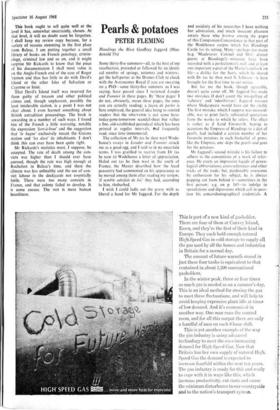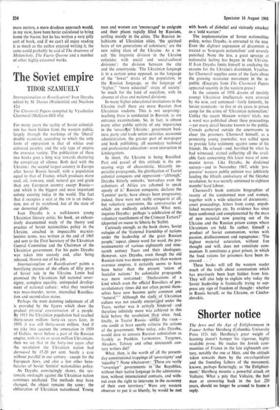Pearls & potatoes
PETER FLEMING
Some thirty-five summers—all, to the best of my recollection, preceded or followed by an identi- cal number of springs, autumns and winters: get the hall-porter at the Drones Club to check with the Astronomer Royal if you are sweating on a PhD—some thirty-five summers as I was saying, have passed since I reviewed Louder and Funnier in these pages. By 'these pages' I do not, obviously, mean these pages, the ones you are actually reading; a Pon de parler is here employed, the general idea being to remind readers that the SPECTATOR is not some here- today-gone-tomorrow scandal-sheet but rather a fine, old-established periodical which has been printed at regular intervals, tnd frequently read, since time immemorial.
The collection of Mr (as he then was) Wode- house's essays in Louder and Funnier struck me as a good egg, and I said so in no uncertain terms. I was gratified to receive from Dr (as he now is) Wodehouse a letter of appreciation. Holed out (as he then was) in the south of France, the Master described how the local peasantry had commented on his appearance as he moved among them after reading my review; semble satisfait de lui,' they had, according to him, rhubarbed.
I wish I could ladle out the gravy with as liberal a hand for Mr Jaggard. For the depth and assiduity of his researches I have nothing but admiration, and much innocent pleasure awaits those who browse among the pages of this Companion-Concordance to that part of the Wodehouse corpus which has Blandings Castle for its setting. Many—perhaps too many (e.g. `Mauleverer, Colonel and Mrs: dinner guests at Blandings)—mitturiae have been recorded with a perfectionist's zeal: and at least one important aspect of the Master's outlook‘on life—a dislike for the Scots, which he shared with Dr (as he then was) S. Johnson—is here brought for the first time to our notice.
But for me the book, though agreeable, doesn't quite come off. Mr Jaggard has made two mistakes (1 don't count the misspelling of `salutary' and `odoriferous'; laggard miscues where Shakespeare would have cut the cloth). The first mistake, which I suppose was unavoid- able, was to print fairly substantial quotations from the works to which he refers. The effect is rather as if Lord Emsworth, hoping to accustom the Empress of Blandings to a diet of pearls, had included a certain number of her favourite potatoes in each basketful of gems; like the Empress, one skips the pearls and goes for the potatoes.
Mr laggard's second mistake is his failure to adhere to the conventions of a work of refer- ence. He erects an impressive façade of genea- logical abbreviations, cross-references and other tricks of the trade; but, pardonably overcome by enthusiasm for his subject, he is always popping out from behind it—sometimes in the first person: e.g. on p. 165—to indulge in speculations and digressions which call in ques- tion his concordantographical credentials. A more austere, a more deadpan approach would, in my view, have been better calculated to bring home the bacon; but he has written a very jolly sort of book, and if we can't all enjoy reading it as much as the author enjoyed writing it, the• same could probably be said of The Anatomy of Melancholy, The Faerie Queene and a number of other highly-esteemed works.



































 Previous page
Previous page